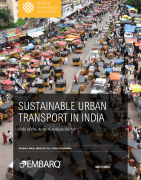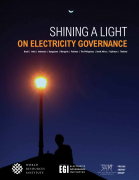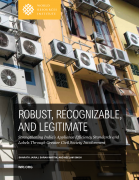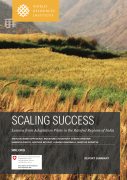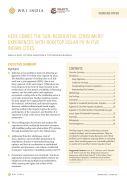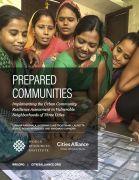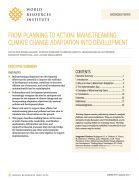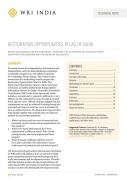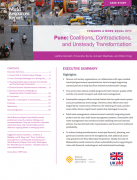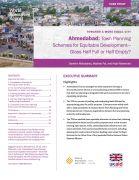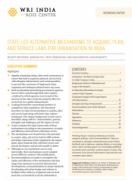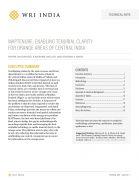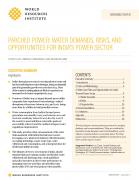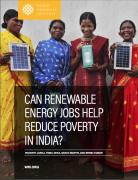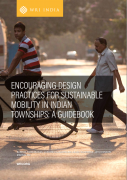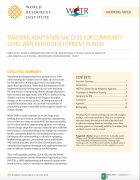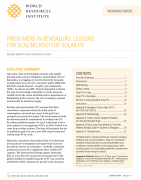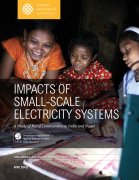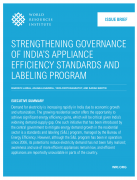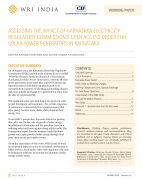Publications
WRI is committed to producing high-quality research, including reports, working papers, issue briefs, and fact sheets. Our publications are subject to peer review, and are held to traditional "academic" standards of excellence, such as objectivity and rigor.
All of our publications are available to download. You may obtain hard copies of select WRI reports at no charge (except shipping and handling) through our print publications catalog.
Subscribe to get notified of new publications or get the RSS feed.
-
Here Comes the Sun
by , e -This working paper documents residential consumers’ experiences with solar rooftop PV systems. The data is captured through household surveys conducted across five Indian cities. The study is an attempt to understand the challenges faced by residential consumers at various stages of their...
-
Prepared Communities
by , , , e -Climate change affects poor and marginalized communities first and hardest. Particularly in cities, a lack of access to basic services, a long history of unsustainable urban development, and political exclusion render the urban poor one of the most vulnerable groups to climate induced natural...
-
From Planning to Action
by , , , , e -As extreme weather events become more frequent and stronger, it is critical that policymakers and development practitioners incorporate climate change adaptation objectives into their sectoral policies and plans. This process, called mainstreaming, has the potential to improve the resilience of...
-
Restoration Opportunities Atlas of India
by , , , , , e -This publication was originally published on WRI.
Protecting forests from degradation, deforestation and fragmentation, and tree-based landscape restoration are globally recognized...
-
Mapping Social Landscapes: A Guide to Identifying the Networks, Priorities, and Values of Restoration Actors
by , , , , , , , , e -This publication was originally published on WRI.
The guidebook takes a new approach to environmental governance by focusing on...
-
Pune: Civil Society Coalitions, Policy Contradictions, and Unsteady Transformation
by , , e -This case study in the World Resources Report, “Towards a More Equal City,” examines the processes of transformative change and the conditions both enabling and inhibiting it in Pune, the second largest city in Maharashtra state, India. Many initiatives across diverse sectors have had a positive...
-
Ahmedabad: Town Planning Schemes for Equitable Development — Glass Half Full or Half Empty?
by , e -This case study in the World Resources Report, “Towards a More Equal City,” examines transformative urban change in Ahmedabad, India, by analyzing the land pooling and readjustment mechanism called Town Planning Scheme (TPS). This paper reviews the evidence on whether the TPS mechanism has...
-
State-led Alternative Mechanisms to Acquire, Plan, and Service Land For Urbanisation in India
by , , e -- Rapidly urbanizing Indian cities need mechanisms to ensure that land is acquired, planned, and serviced with adequate infrastructure and social amenities, to prevent the occurrence of haphazard urban expansion and under-provisioned inner-city areas.
- Such mechanisms should help ...
-
MAPTenure: Enabling Tenurial Clarity for Orange Areas of Central India
by , e -More than half the villages of Madhya Pradesh and Chhattisgarh are affected by a peculiar issue of tenurial ambiguity called “orange areas.” This issue impacts nearly 1.2 million hectares and 1.5 million, largely poor, landless and tribal families, that depend on these lands for food, fuel,...
-
Reducing Risk, Addressing Climate Change Through Internal Carbon Pricing
by e -A growing number of businesses around the world are turning to internal carbon pricing as a tool to manage climate-related risks and transition to a low-carbon economy. There are early signs that internal carbon pricing is making inroads into progressive Indian businesses as well. But the early...
-
Parched Power: Water Demands, Risks, and Opportunities for India’s Power Sector
by , e -This paper aims to help decision-makers understand the magnitude of water issues for the thermal power sector in India with quantitative evidence. There is a significant data gap in power plant water use in India. The authors used data science techniques and innovative methodologies and...
-
Can Renewable Energy Jobs Help Reduce Poverty in India?
by , , e -India launched a massive renewable energy push in 2014 — a move that could bring electricity and jobs to poor, rural communities across the country. The government set ambitious targets to generate 160 gigawatts of wind and solar power by 2022, and a study from the Council on Energy, Environment...
-
Encouraging Design Practices for Sustainable Mobility in India: A Guidebook
by , , , e -Encouraging Design Practices for Sustainable Mobility in Indian Townships: A Guidebook, is WRI India’s publication that highlights the role of urban design interventions that can be applied in townships or gated communities in cities, that promote the use of sustainable modes such as walking,...
-
Tracking Adaptation Success for Community Level Watershed Development in India
by -This working paper presents a joint effort by the World Resources Institute and the Watershed Organisation Trust (WOTR), a WSD implementing and research organization based in Pune, India, to develop an adaptation monitoring and evaluation (M&E) or tracking system to track success of WSD...
-
Prosumers in Bengaluru
by -The City of Bengaluru in the Indian state of Karnataka is making progress on rooftop solar PV installations, mainly through its utility implemented net-metering program. Yet, much more needs to be done if the state is to reach its 400 MW rooftop solar target by 2018. This working paper provides...
-
The Future Electricity Grid
by -Renewable energy (RE) is growing worldwide, with a six-fold increase in non-hydro renewables over the last decade from 85 to 657 gigawatts (GW). This report reviews the key trends that explain growth in RE, and highlights how they are challenging decision making in countries such as Brazil,...
-
Impacts of Small-Scale Electricity Systems: A Study of Rural Communities in India and Nepal
by -This study assesses and compares the benefits of electricity service to households and small enterprises from microgrids, solar home systems (SHS), and the national grid in select rural communities in India and Nepal. Electricity access, in general, leads to reduced kerosene use, more time spent...
-
Strengthening Governance of India's Appliance Efficiency Standards and Labeling Program
by -This issue brief examines how improved governance can help make India’s appliance efficiency standards and labelling program more successful. We focus particularly on standard setting, program implementation, and monitoring and verification through the lens of transparency, accountability,...
-
Assessing the Impact of Karnataka Electricity Regulatory Commission’s Open Access Order for Solar Power Generators in Karnataka
by -On 18 August 2014, the Karnataka Electricity Regulatory Commission (KERC) passed order number S/03/01 called ‘Wheeling Charges, Banking Charges & Cross Subsidy Surcharge for Solar Power Generators’, whereby all solar power generators in the state who achieved Commercial Operation Date (COD)...
-
Aggregating Demand for Corporate Rooftop Solar Installations: Lessons from the Collaborative Solar PV Procurement Project
by -WRI India and Confederation of Indian Industry (CII) through the Green Power Market Development Group (GPMDG) initiative attempted to aggregate energy demand from six corporate buyers in Bengaluru—Coca Cola, Infosys, IBM, Cognizant, Philips and Bangalore International Exhibition Center (BIEC)....

